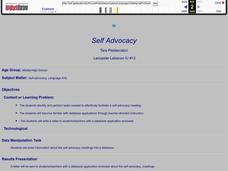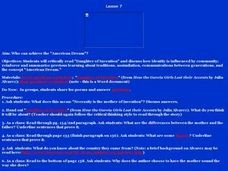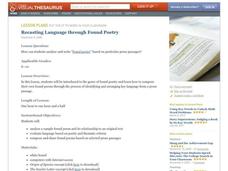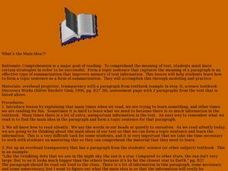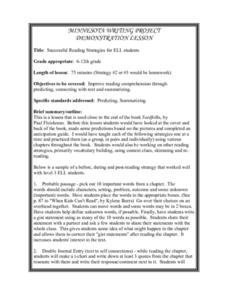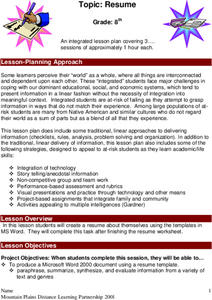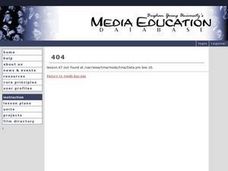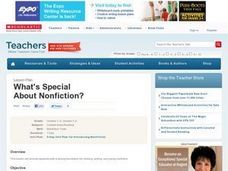Curated OER
5 Types of Chemical Reactions and a Lab on Mole
Students recognize the concepts of the five general types of chemical reaction: combination, decomposition, single replacement, double replacement and combustion. They practice classifying chemical equations and determine the moles in a...
Curated OER
Literature Circles
Introduce how Literature Circles are formed in a classroom with this slide show. The slides go over each of the jobs that the students take on, such as: Discussion Director, Character Analyzer, Artful Artist, and Text Connector. After...
Curated OER
Self Advocacy
Students determine the procedures for facilitate a self-advocacy meeting. They enter information about the meetings in a database which they include in a letter summarizes the meeting.
Curated OER
Who Can Achieve the "American Dream"
Exploring the idea of working to achieve the American Dream, the class reads an excerpt from How the Garcia Girls Lost their Accents by Julia Alvarez. Following, the class analyzes the excerpt and discusses the theme of the reading using...
Curated OER
Nonfiction Genre Mini-Unit: Persuasive Writing
Should primary graders have their own computers? Should animals be kept in captivity? Young writers learn how to develop and support a claim in this short unit on persuasive writing.
Curated OER
Plot the Oysters' Peril!
Use comic strips to teach sequencing in narrative poetry. As homework, each class member selects a comic strip with 4-8 frames, cuts the frames apart, places the pieces in an envelope, and brings the envelope to class. Class members swap...
Curated OER
Civil Service Reform: Senate Debates
Students examine the 1883 Pendleton Civil Service Reform Act. They discuss the spoils system, answer discussion questions, read and analyze speeches, complete a worksheet summarizing their findings, and report their findings to the class.
Curated OER
Recasting Language through Found Poetry
Discover the concept of found poetry in this engaging lesson. Secondary students will explore the poem "Natural Selection" and compare it to the writings of Charles Darwin in Origin of the Species. Students chose a text and create...
Columbus City Schools
Poetry Speaking and Listening Standards
Celebrate April's National Poetry Month or enrich a poetry unit with a wealth of language arts material. Class members develop an oral interpretation of a poem and/or develop a podcast interview with a poet.
Polk County Public Schools
Suffragists
The Women's Rights movement is the focus of an engaging and collaborative exercise, in which young historians use information found in textbooks, class notes, and the provided documents to craft a DBQ essay.
NASA
Catch a Piece of the Sun
What does the sun mean to you? Learners have many different interests that may have connections to the sun. Whether its solar radiation, solar flares, or solar storms, there are connections to daily interests that may surprise your...
Curated OER
What is The Main Idea
Young scholars will investigate why comprehension is a major goal of reading. To comprehend the meaning of text, students must know certain strategies in order to be successful. Form a topic sentence that captures the meaning of a...
Curated OER
Successful Reading Strategies for ELL Students
Students improve their reading comprehension through predicting, connecting with text and summarizing. Students should have already read the book Seedfolks and made predictions based upon what they had seen from the cover and pictures...
Curated OER
"Thunder Butte"
Sixth graders review as a class the story "Thunder Butte". Together they write an outline of the story following the sample and then pick four main parts of the story giving supporting details for each one. They compare Sarah's view with...
Curated OER
Computer Book Report
Third graders, after watching a demo by the teacher, fills in his own sample book report card on the computer. They also enter information into a database.
Curated OER
Design a Latin American Restaurant
Learners investigate the culture of a Latin American country to design a new restaurant. In this Latin American lesson, students identify social classes, geographical locations, cultural practices, and monetary systems of a Latin...
Curated OER
Resume
Students create a resume for themselves using a Microsoft Word template. Students view and evaluate sample resumes and complete a worksheet to determine the information they should include in the resume they complete for themselves.
Curated OER
World Religion At A Glance
Ninth graders research and assigned religion and fill out information they gather on their "Special Assingment Instruction Sheet." They create a sample brochure about the religion they researched, edit the brochure with another student...
Curated OER
Postcards from the Past
Pupils create postcards from the past by summarizing a historical event. Then they design illustrations for their postcards and send them off to another teacher at their school.
Curated OER
Free Market Labor vs. Slave Labor
High schoolers summarize support for free market labor vs. slave labor in antebellum America. They explain how existing economic conditions influence support for free market labor vs. slave labor.
Curated OER
Phenomenology Lesson Plan #7: Theme Part 2
Students summarize the Phenomenology unit in this lesson. They identify character and universal themes from different films. They create a ten question survey for reviewer responses.
Curated OER
Mini-Lesson Planning for Inferences
Making inferences and drawing conclusions is a key component to successful active reading. Encourage your class to use context clues and prior knowledge to infer different elements of a story, including the setting, plot, and character...
Curated OER
Story Summaries; The Three Little Pigs
Students explore language arts by completing a graphic organizer in class. In this story structure lesson plan, students read the classic tale "The Three Little Pigs" and discuss the main characters, conflict and setting. Students...
Curated OER
What's Special About Nonfiction?
Students examine the difference between nonfiction and fictional writing. They identify the characteristics of nonfiction literature and examine how a nonfiction textbook organizes information.




